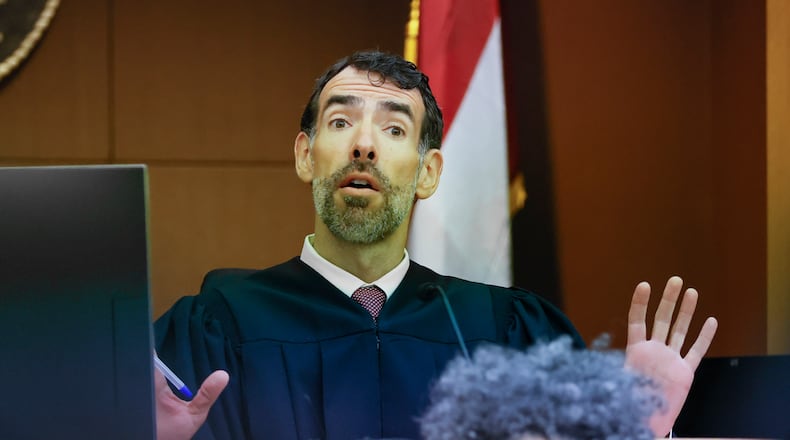It seems the most contentious legal cases in Georgia have a common denominator: Judge Robert McBurney.
On Monday, McBurney, a Fulton County Superior Court judge, will sit in judgment of someone higher up the judicial food chain. Christian Coomer, who sits on the state appeals court, is accused of fleecing a client years ago when he was a mere lawyer/legislator.
The quasi-trial being held by the Judicial Qualification Commission (JQC) — McBurney sits on its hearing panel — could strip Coomer of his robe. He’s the first state appellate court judge to stand trial for alleged ethics violations.
The next week, McBurney returns to his day job to hear arguments from abortion rights supporters who want him to block Georgia’s new restrictive abortion law. The state asked him to block the hearing until after next month’s election. Pushing the matter back makes sense — for Republicans. Polls show most Georgians oppose the new law and bringing this up now might spur more Dems to the polls.
McBurney waved off those concerns and will hold a two-day bench trial Oct. 24-25.
A week ago, McBurney refused to open the jail door for Tex McIver, who sought bond after his murder conviction in the killing of his wife was overturned. Tex is the clueless, connected Buckhead lawyer who shot his wife to death in the family SUV. The state Supreme Court said Fulton prosecutors served up a case with “weak” evidence, although it was fortified by McBurney allowing in evidence he shouldn’t have.
Nonetheless, McBurney denied McIver bond, claiming the 79-year-old might vanish if given the chance.
And McBurney is the referee in the nation’s most watched legal sideshow. He’s overseeing the special purpose grand jury investigation of former President Donald Trump. The ongoing probe is trying to determine if Trump and his cronies tried to illegally overturn the 2020 election and if they should be criminally charged.
Credit: HYOSUB SHIN / AJC
Credit: HYOSUB SHIN / AJC
Because of the mix of cases, McBurney has received great renown.
“He’s caught every sticky case in Fulton County,” said attorney Lester Tate, who used to serve on the JQC. “I think there are (judges) who shy away from high-profile cases. But he’s not afraid and is willing to step up.”
McBurney waves off contentions concerning his fortitude. His handling of the Trump case, he told me, “is purely random.”
Fulton’s 20 Superior Court judges all dropped their names in a hat to determine who’d oversee this blockbuster. Many judges, if not most, no doubt crossed their fingers hoping someone else would “win.” McBurney’s name got pulled.
“Call it good luck, call it bad,” he said. “It was chance and not at all me raising my hand.”
He is aware of the “microscope” attached to the case, making him more apt “to doublecheck things.”
“If there’s a misfire, someone’s going to pounce on it,” he said. “It’s not so much I worry someone will say ‘McBurney is an idiot,” as they might say, ‘This isn’t being run in a way where they are taking it seriously.’ And we are taking it seriously.”
The notoriety is new. “The scope of recognition in the past was being named in the office newsletter,” he said. Now, his parents call to say, “Rachel Maddow mentioned your name.”
The rawboned McBurney, an Oakland, California native, is a photojournalist’s dream. His arms flap around to make points while his thick black eyebrows pop up and down.
Credit: Miguel Martinez
Credit: Miguel Martinez
His oratory, and writing skills, ensure hearings in his court and his rulings won’t be boring.
McBurney has largely ruled in favor of District Attorney Fani Willis as she investigates Republicans in the Trump case. But then she hosted a fundraiser for Democrat Charlie Bailey, running for lieutenant governor against GOP candidate Burt Jones, one of the fake Electoral College electors she was investigating. McBurney called it a “What are you thinking? moment” and pulled Jones from the case to prevent any perceived conflict of interest.
Earlier, he suffered through the legal gobbledygook served up in an election lawsuit by former U.S. Sen. David Perdue before tossing the case. He called it “speculation, conjecture, and paranoia. . . fodder for talk shows.”
The Harvard Law-educated McBurney rose quickly in the Fulton DA’s office before jumping to the U.S. Attorney’s office where he handled public corruption cases and a high-profile terrorism prosecution.
In 2012, he told the governor’s office he’d like to be a Fulton judge. David Nahmias, the former U.S. Attorney, kind of thought he was nuts.
“Our reaction was why would you leave the federal prosecutor’s office to go to Fulton with huge caseloads?” said Nahmias. “It can be a difficult place to be a judge.”
McBurney loved the federal gig but after 10 years of prosecuting cases, he figured the next 10 would be more of the same.
He likes the black robes. He’s been Fulton’s chief judge and has served on the Repeat Offender Commission, the panel trying to solve the perpetual revolving door plaguing Fulton’s criminal justice system. A 2019 review of judges found McBurney to be the Fulton judge most likely to toss a repeat offender back in the slammer.
On top of all his other duties, McBurney is one of the judges running Fulton’s accountability court, which tries to get alternatives to incarceration for drug users. As to whether he still has a prosecutor’s heart, he said he uses jail as a “last resort” when his other judicial tools don’t work.
Sometimes, you must use the hammer.
About the Author
Keep Reading
The Latest
Featured



